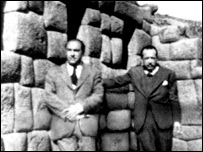A Lesson from the Greats: How to Attain Solitude by Way of an Exciting Social Life
Katie Condon
Sep 01, 2013
It's easy to romanticize the relationship between solitude and the writer. Easy to smile when we picture Thoreau traipsing off into the woods to write Walden. Easy to think that all we have to do to be good writers is hermit ourselves. Let's stop giving into this romanticism right now. Because pretending that sitting alone in a small room for a month will suddenly generate perfect, honest writing is a dangerous misconception. (Yes, even if that room is in the middle of the woods.) Sure, solitude is important for writers. It's imperative, really. But solitude isn't simply a matter of being physically alone. Solitude is a state of mind. A state of mind that is difficult to access. We have to prepare ourselves for solitude. We have to inform it in the same ways we inform our writing. Solitude, too, is contingent upon experience and the ways in which experience settles within us. Let's not hole ourselves up in our rooms, folks. Instead, let's take a look at five writing-tips-disguised-as-social-tips offered to us from some of the greats. Five Fun Things to Do Now, So Solitude May Follow Later
1. Have a Dinner Party.
In 1817, painter Benjamin Robert Hayden had John Keats, William Wordsworth, and Charles Lamb over for dinner. They talked about the merits of Homer, read poetry, debated about art and science, and got a good buzz on.
Try it: Order a pizza. Invite friends over. Drink beer. Talk about things that inform your work.
2. Work Collaboratively.
Truman Capote and Harper Lee worked together to gather research for what would become Capote's In Cold Blood. In Paris, guys like Marcel Duhamel, André Breton, Jacques Prévert and Yves Tanguy played writing games, including Exquisite Corpse, which generated sentences like this one: "The completely black light lays down day and night / the powerless suspension to do any good."
Collaboration is good for the mind. It sharpens our creativity and gives us a chance to observe other's creative processes. Here are some current writers coming up with beautiful things in pairs:
Because You Can Have This Idea About Being Afraid of Something (by Emily Pettit with artwork by Bianca Stone)
SHUT UP & BLOOM (by Matthew Suss & Ben Kopel)
3. Have Friendly Competition.
4. Have Workshop Parties*.
Back in the day these things were called literary salons. Gertrude Stein's salon in Paris is a famous one; by way of these gatherings she became both a mentor to and critic of writers like Hemingway and Joyce.
There needn't be a head honcho like Stein or even a "workshop leader" running the show in order for us to share and talk about our writing with buddies. Combine this with number 1 should you wish for more pizza and beer.
Five Fun Things to Do Now, So Solitude May Follow Later
1. Have a Dinner Party.
In 1817, painter Benjamin Robert Hayden had John Keats, William Wordsworth, and Charles Lamb over for dinner. They talked about the merits of Homer, read poetry, debated about art and science, and got a good buzz on.
Try it: Order a pizza. Invite friends over. Drink beer. Talk about things that inform your work.
2. Work Collaboratively.
Truman Capote and Harper Lee worked together to gather research for what would become Capote's In Cold Blood. In Paris, guys like Marcel Duhamel, André Breton, Jacques Prévert and Yves Tanguy played writing games, including Exquisite Corpse, which generated sentences like this one: "The completely black light lays down day and night / the powerless suspension to do any good."
Collaboration is good for the mind. It sharpens our creativity and gives us a chance to observe other's creative processes. Here are some current writers coming up with beautiful things in pairs:
Because You Can Have This Idea About Being Afraid of Something (by Emily Pettit with artwork by Bianca Stone)
SHUT UP & BLOOM (by Matthew Suss & Ben Kopel)
3. Have Friendly Competition.
4. Have Workshop Parties*.
Back in the day these things were called literary salons. Gertrude Stein's salon in Paris is a famous one; by way of these gatherings she became both a mentor to and critic of writers like Hemingway and Joyce.
There needn't be a head honcho like Stein or even a "workshop leader" running the show in order for us to share and talk about our writing with buddies. Combine this with number 1 should you wish for more pizza and beer.
 *Parties must happen in person. No e-mail workshops allowed, y'all.
5. Travel When You Can.
If Pablo Neruda hadn't gone to Macchu Picchu, if Jack Kerouac hadn't driven across the country, or if Elizabeth Bishop hadn't traveled most of the world we'd have missed out on The Heights of Macchu Picchu, On the Road, and much of Bishop's work (like Over 2,000 Illustrations and a Complete Concordance).
*Parties must happen in person. No e-mail workshops allowed, y'all.
5. Travel When You Can.
If Pablo Neruda hadn't gone to Macchu Picchu, if Jack Kerouac hadn't driven across the country, or if Elizabeth Bishop hadn't traveled most of the world we'd have missed out on The Heights of Macchu Picchu, On the Road, and much of Bishop's work (like Over 2,000 Illustrations and a Complete Concordance).
 |

Comments (1)
Lauren Fosgett:
Oct 07, 2013 at 10:45 AM
This is a great list. Sometimes it is best to live well and experience life with other people.
Add a Comment